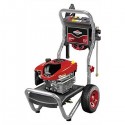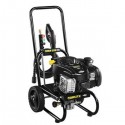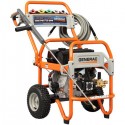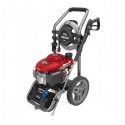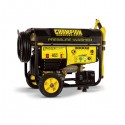Gas Pressure Washer Reviews
These are the 10 best gas pressure washers based on product quality, customer satisfaction, and price:
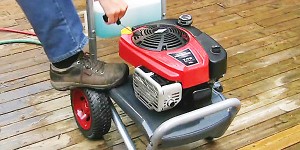 There are a number of very good reasons that so many contractors and homeowners prefer to stick to gas pressure washers as opposed to electric ones. Gas pressure washers provide a great deal of versatility for a wide array of cleaning jobs, from the backyard and household to the commercial job site. These machines pack more pounds per square inch and higher flow rates than electric powered pressure washers can, and that is not the only advantage they provide. Gas pressure washers are able to produce cold water sprays, but unlike electric power washers these machines can produce scalding hot water sprays as well.
There are a number of very good reasons that so many contractors and homeowners prefer to stick to gas pressure washers as opposed to electric ones. Gas pressure washers provide a great deal of versatility for a wide array of cleaning jobs, from the backyard and household to the commercial job site. These machines pack more pounds per square inch and higher flow rates than electric powered pressure washers can, and that is not the only advantage they provide. Gas pressure washers are able to produce cold water sprays, but unlike electric power washers these machines can produce scalding hot water sprays as well.
For a number of job types – cleaning grease and oil from driveways and shop floors, blasting material that is not water soluble from equipment and walls – a hot water spray is much better equipped to getting the job done. Finally, gas pressure washers are not tethered to a power outlet the way electric pressure washers are. That means they are much more mobile: you can literally take gas pressure washers anywhere you need them.
Gas pressure washers are generally preferred by contractors and landscaping businesses to electric ones because of the high PSI and flow rates they provide. Larger operations may look into big gas pressure washers that mount on trailers or on the back of pickup trucks; these models often are able to carry their own water reservoir and are excellent for big cleanup jobs, work sites, and uses in construction.
Smaller operations will usually do just fine with a standard size gas pressure washer; these machines require an external water source, but are typically lightweight and maneuverable. They cut cleanup and prep times down by huge margins and can quickly pay for themselves in the amount of money they save on paying workmen to clean job sites by hand. With a gas pressure washer in their hand, a contractor can quickly blast paint from a wall, and a landscaper will be able to clear organic detritus off of walkways or driveways in just a few minutes.
Homeowners will also appreciate the cleaning power of gas pressure washers. These machines can help you wash your truck or SUV easily, clean oil stains from your garage floor, wash siding and decks quickly and efficiently, and – because they use hot water to do it – clean dirt and mud from walls and windows gently and fast.
There are a number of important criteria to look at when you are selecting a gas pressure washer. You want to make sure you are getting a machine that is just right for your needs. Because of that it is important to first take stock of what kinds of jobs you will be using it for. When you have a clear picture of the tasks you will be applying a gas pressure washer to, you can get a clearer picture not only if gas pressure washers are in fact right for the job, but more importantly what kind of gas pressure washer is just right for you.
1. Gas Pressure Washer Selection Criterias
1a. Fuel Efficiency
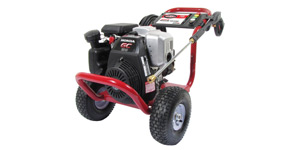 As with any other gas powered machine, vehicle, or tool, fuel efficiency is always going to be an important criterion when you are selecting a new gas pressure washer. This is especially true in the last ten years or so, when gasoline prices began spiking and never seemed to stop going up. With a gas pressure washer, you get increased power and performance, but it comes at a cost. It is important to find a model that helps minimize that cost as much as possible. Over the long term, fuel costs will add up, but you can help to ensure they do not get out of hand by finding a fuel efficient model.
As with any other gas powered machine, vehicle, or tool, fuel efficiency is always going to be an important criterion when you are selecting a new gas pressure washer. This is especially true in the last ten years or so, when gasoline prices began spiking and never seemed to stop going up. With a gas pressure washer, you get increased power and performance, but it comes at a cost. It is important to find a model that helps minimize that cost as much as possible. Over the long term, fuel costs will add up, but you can help to ensure they do not get out of hand by finding a fuel efficient model.
Higher fuel efficiency rarely translates to less power on a machine like a gas pressure washer; unlike a car or a lawn mower, you are not running a drive train off of the engine, so pickup and torque are not going to be effected by fuel efficiency. Instead, the fuel efficiency is simply a measure of how well made the machine’s engine and pump system are. As a result, looking at fuel efficiency is a good way to quickly get a sense of how good of an engine a particular gas pressure washer has.
Higher fuel efficiency does not just affect the amount of gas you will have to be putting into your gas pressure washer; it also affects the amount of emissions the machine produces. This is important for two reasons. The first is a basic safety concern. If you are ever going to be using your gas pressure washer in an enclosed space, you want to ensure that you are minimizing the amount of fumes the engine is giving off. Higher fumes in enclosed spaces can be very dangerous. It is worth mentioning that if you ever do use a gas pressure washer in an enclosed space like a garage or shop, make sure the space is well ventilated and you are wearing proper protective breathing gear.
The second reason the emissions are important is because higher emissions mean a higher carbon footprint. This is not only important for environmental reasons: if a small machine produces too much exhaust, there is a possibility that it may not meet the standards set by the California Air Resources Board governing small engine carbon emissions. When this is the case, you cannot purchase the machine in not only California but 13 other states that also apply those standards.
1b. PSI & Flow Rate
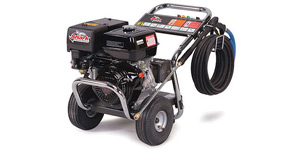 The pressure and flow rate of a gas pressure washer are two of the most important criteria to look at. These are the metrics that describe the overall performance of the pressure washer. Pressure is a measure of pounds per square inch, and it describes how much force the gas pressure washer will be applying to a surface when it is turned up to full blast. Residential gas pressure washers typically have maximum pressures of about 2500 pounds per square inch, while commercial gas pressure washers have maximum pressures of over 3,000 PSI. The PSI that is right for you depends on what you will be using the machine for.
The pressure and flow rate of a gas pressure washer are two of the most important criteria to look at. These are the metrics that describe the overall performance of the pressure washer. Pressure is a measure of pounds per square inch, and it describes how much force the gas pressure washer will be applying to a surface when it is turned up to full blast. Residential gas pressure washers typically have maximum pressures of about 2500 pounds per square inch, while commercial gas pressure washers have maximum pressures of over 3,000 PSI. The PSI that is right for you depends on what you will be using the machine for.
For residential and smaller contractor or landscaping operations, you really do not need a maximum PSI of much more than about 2500. This kind of pressure is more than enough to strip loose paint from houses, clean organic matter from siding and walls, and clean equipment or job sites. Higher PSIs will often come at an inflated cost, and they are only really necessary for jobs like removing graffiti from concrete walls, cleaning industrial or construction job sites, and the like. At the same time, having a higher maximum PSI also increases your options over a broader range: you will have a number of pressure settings below the maximum PSI, and you will likely be using these settings most of the time, but it can be nice to have the choice to dial the PSI up to high settings in some cases.
Flow rate is a measure of gallons per minute, and it describes how much water is going to be hitting the surface you are cleaning. Flow rate is important because it affects how wide the stream of water can be while still holding a particular PSI. A gas pressure washer with a very high PSI rating but a very low flow rate will be hitting the surface with a lot of force, but may only be able to do so in a fairly narrow stream, which will be less effective than a gas pressure washer with a high PSI and a high flow rate. Just as with PSI, flow rates will also be able to be adjusted down from the highest setting, and this can be important. You will want to avoid hitting porous surfaces like untreated wood with very high flow rates, as this can quickly make the wood sodden, at which point it will take hours or even days to dry out.
1c. Engine
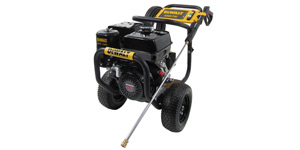 In any gas powered machine, the make and design of the engine is going to be of huge importance to the overall performance of the unit. There are a number of things to look for when you are discussing a gas pressure washer’s engine: its horsepower, its displacement, its torque, and the manufacturer. The first criteria describe the engine’s power and performance, and the last one is a good subject to get at least marginally familiar with so you can quickly tell if a machine has an engine that was made by a trusted manufacturer or not.
In any gas powered machine, the make and design of the engine is going to be of huge importance to the overall performance of the unit. There are a number of things to look for when you are discussing a gas pressure washer’s engine: its horsepower, its displacement, its torque, and the manufacturer. The first criteria describe the engine’s power and performance, and the last one is a good subject to get at least marginally familiar with so you can quickly tell if a machine has an engine that was made by a trusted manufacturer or not.
The horsepower is a basic metric for an engine’s performance that most consumers are already pretty familiar with. Anyone who has ever owned a car – or for that matter seen a car commercial – will have heard the term at some point. While cars have horsepower ratings in the hundreds, small machines like gas pressure washers have horsepower in the single digits, for the most part. A gas pressure washer that has an engine with an HP of 5.0 is going to be very robust. Frankly, any HP above 3.0 will be likely to be able to take care of any residential or small commercial job.
HP alone does not give a full description of an engine’s power, though: that is up to displacement and torque as well. An engine’s displacement is its size, and it is measured in cubic centimeters. Most small engines of the kind found on gas pressure washers will have displacements around 150 – 200 cubic centimeters. Higher displacements indicate more powerful engines. Finally, try to find out an engine’s torque, if possible. This is perhaps one of the least understood values for measuring an engine’s power and performance, but it is actually rather simple. Torque, measured in foot-pounds, describes the rotational force the engine produces. Any small engine with a torque of more than four or five foot-pounds is going to be quite robust. Combine these metrics with the HP and you will have a good idea of how powerful the engine is.
Finally, it can be useful to familiarize yourself with the different manufacturers of small engines and small engine components. That way you can know whether the engine in your gas pressure washer is backed by a reputable company or not. Some of the leaders in small engine manufacturing include Briggs & Stratton, Kohler, and Honda.
1d. Design & Accessories
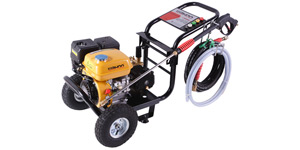 Beyond metrics like the PSI and flow rate, the engine’s HP and torque, there are a number of other aspects to a gas pressure washer that are going to collectively affect your overall experience using it. These include the overall manufacturing and design of the machine, as well as the accessories it provides its user. Put simply, higher quality parts make for a better experience, and there are a number of accessories in particular that are virtually must haves.
Beyond metrics like the PSI and flow rate, the engine’s HP and torque, there are a number of other aspects to a gas pressure washer that are going to collectively affect your overall experience using it. These include the overall manufacturing and design of the machine, as well as the accessories it provides its user. Put simply, higher quality parts make for a better experience, and there are a number of accessories in particular that are virtually must haves.
A gas pressure washer for residential or small contractor use should be compact, lightweight, and easy to use. The more compact the footprint can be without sacrificing PSI or flow rate, the better it is for your overall experience. Any homeowner with a garage that is packed to the gills with lawn and garden equipment as well as any contractor with a truck full of tools and machines will tell you that smaller is always more convenient. You want a footprint that can support a robust machine but also does not take up too much room needlessly. The weight of the machine will also be an issue: you do not want a gas pressure washer that is too heavy to maneuver around your driveway or the job site.
There are a number of accessories that you should pay careful attention to when you are selecting your gas pressure washer. You want to make sure, first of all, that it has a long enough hose that you will be able to conveniently use it without having to take it with you everywhere you go. This can be especially important if you are using the gas pressure washer in an enclosed space, because a longer hose will allow you to park the washer itself outdoors where it can harmlessly discharge its fumes. The wand that the washer comes with is likewise important: you want a long one that is easy to manipulate. Gun wands are useful: they operate via a trigger at the rear handle.
If the gas pressure washer does not have a trigger operated pressure mechanism – which is by far the easiest to operate – make sure it comes with a wide variety of nozzles. Especially when you are purchasing a pressure washer with a very high max PSI, you want to make sure that you have a wide variety of pressures to choose from so that you can carefully work your way up to the right one. Finally, multiple onboard detergent reservoirs are also very useful for big or varied jobs.
1e. Pricing
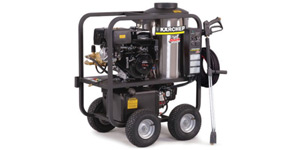 Because gas pressure washers come in such a wide variety of styles, applications, sizes and ability, there is a similarly wide range of pricing. This can be a bit overwhelming at first, but if you have carefully determined what features and criteria are most important for your job’s needs, you should have managed to narrow down your selection to one of a few types.
Because gas pressure washers come in such a wide variety of styles, applications, sizes and ability, there is a similarly wide range of pricing. This can be a bit overwhelming at first, but if you have carefully determined what features and criteria are most important for your job’s needs, you should have managed to narrow down your selection to one of a few types.
Commercial gas pressure washers are the most expensive kind. These include the very large gas pressure washers that carry independent water reservoirs and have to be mounted on trailers or pickup truck beds. For the most part, these are going to be well outside of any homeowner’s budget and are also unlikely to be affordable for small scale contractors or landscapers – but the fact is, they are not necessary for the kinds of jobs these consumers have.
Smaller commercial gas pressure washers will fall into the middle of the price range, and while they are affordable for most small scale commercial operations, they are also a bit too expensive to make sense for most homeowners to invest in them. Smaller commercial gas pressure washers will have higher PSIs – generally around 3,000 or more – and higher flow rates. They are self-contained, though, and are fairly compact and lightweight. These machines almost always have a mechanism to heat water on them, and often have long hoses with high-end wands and multiple reservoirs for detergents or other chemical solvents.
Residential grade gas pressure washers are the smallest and least expensive of the bunch. These machines still have higher PSIs and flow rates than electric residential pressure washers and are often also able to independently heat water downstream from its source. These units are able to deal with just about any job a homeowner could need them for, and are frankly quite well equipped for most jobs a landscaping company or small scale painting or contracting business could need them for.
Take care to make sure when you are looking at prices that you are not only looking at prices. There is a difference between price and value in a product, and you want to make sure you are not being blinded by a higher price tag or seduced by an unexpectedly cheap price tag, either. While the maxim that you get what you pay for is certainly true most of the time, it is not always the case.
For that reason, it is important to pay careful attention to the parts a machine was made with, the engine manufacturer and other criteria before you start looking at prices. Shop smart, familiarize yourself with the different criteria for gas pressure washers, and do not rush into making a purchase, and you will be fine.
2. Best Gas Pressure Washer Reviews
Simpson PS4240-S 




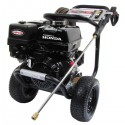
Simpson PS4240-S is the kind of serious commercial pressure washer that is designed to offer superior power and performance over the long term. With an engine that is made by one of the top manufacturers in the world, it can consistently provide the kind of reliable power that you need to take care of big [...]
Generac 6412 




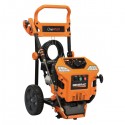
The Generac 6412 is a high quality commercial pressure washer that has a superior PSI and flow rate to other models. It has the kind of high cleaning power rating that you are going to want if you are looking for a machine that can take care of serious stains easily. Whether you are planning [...]
Simpson PS3228-S 




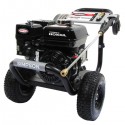
The Simpson PS3228-S is nicknamed the “Power Shot” for a very good reason. This pressure washer packs a lot of power into a relatively small space, and as soon as you unload it you can see why. This pressure washer is not the kind of huge, bulky commercial pressure washer that you will have trouble [...]
Simpson MSH3125-S 




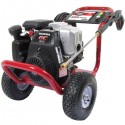
The Simpson MSH3125-S has the kind of powerful engine and sleek design that will make it easy to take care of lots of different tasks with it – so easy, in fact, that you may find yourself wishing there were more chores around the house that you could use it to take care of quickly [...]
Brute Power 20554 




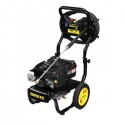
Brute Power 20554 has a high quality engine that is driving an axial cam pump that can deliver a cleaning power rating that certainly lives up to this pressure washer’s name. It has a powerful spray along with plenty of options to make sure you are always prepared for any job you might come across [...]
These are the 10 best gas pressure washers based on product quality, customer satisfaction, and price:

